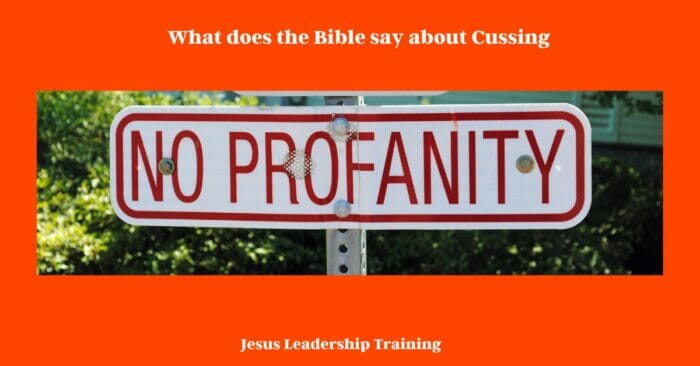What does the Bible say about cussing? Using Cuss words or curse words. This is a question that many people ask, and there is no easy answer. The Bible doesn’t specifically say “thou shalt not curse,” but it does give us some principles to follow when it comes to this issue. In this blog post, we will explore what the Bible has to say about cussing and what it means for us today.
Table of Contents
What does the Bible say about Cussing
There are a lot of things said about swearing. People seem to have strong opinions on whether Christians should cuss or not. The truth is that the Bible doesn’t specifically address the issue of swearing. However, there are principles in Scripture that can guide us as we make a decision about using foul language.
First, let’s look at what the word “swear” actually means. To swear can simply mean to make a promise. For example, when you get married, you swear to be faithful to your spouse.
What does the Bible say about Cussing KJV
This is a good and honorable thing. But when people swear, they often use language that is vulgar and offensive. This is the type of swearing we will be addressing in this blog post.
It’s intriguing to explore how the Bible, while being a spiritual and moral guide, also doesn’t shy away from tackling complicated issues. Sometimes the Bible will speak negatively about certain actions or behaviors as a way of teaching lessons. Below is a table of some Bible verses that highlight things spoken of in a negative light, usually to offer a contrasting positive virtue or guidance.
| Topic | Bible Verse | Summary |
|---|---|---|
| Anger | Ephesians 4:26-27 | “In your anger do not sin”: Do not let the sun go down while you are still angry, and do not give the devil a foothold. |
| Greed | Luke 12:15 | “Watch out! Be on your guard against all kinds of greed; life does not consist in an abundance of possessions.” |
| Pride | Proverbs 16:18 | “Pride goes before destruction, a haughty spirit before a fall.” |
| Hypocrisy | Matthew 23:13-15 | Woes to the religious leaders for their hypocrisy and leading people astray. |
| Dishonesty | Colossians 3:9 | “Do not lie to each other, since you have taken off your old self with its practices.” |
| Jealousy | James 3:14-16 | Jealousy and selfishness can lead to “disorder and every evil practice.” |
| Fornication | 1 Corinthians 6:18 | “Flee from sexual immorality. All other sins a person commits are outside the body, but whoever sins sexually, sins against their own body.” |
| Idolatry | Exodus 20:3-5 | The commandment against having other gods and making idols. |
| Drunkenness | Ephesians 5:18 | “Do not get drunk on wine, which leads to debauchery.” |
| Revenge | Romans 12:19 | “Do not take revenge, my dear friends, but leave room for God’s wrath.” |
| Hatred | 1 John 2:9 | “Anyone who claims to be in the light but hates a brother or sister is still in the darkness.” |
| False Witness | Exodus 20:16 | “You shall not give false testimony against your neighbor.” |
| Sorcery | Galatians 5:19-21 | Lists sorcery as a work of the flesh that prevents inheriting the kingdom of God. |
Remember, while these verses speak negatively about certain actions or attitudes, the overarching message is usually aimed at spiritual growth and positive transformation. 😊

So, what does the Bible say about using offensive language? Well, there are a number of verses that deal with our speech in general. For example, Ephesians 4:29 says, “Do not let any unwholesome talk come out of your mouths, but only what is helpful for building others up according to their needs, that it may benefit those who listen.” This verse speaks to the overall tone of our speech. As Christians, we should be striving to build others up—not tear them down. A good Man will monitor his tongue

In addition, Colossians 3:8 says, “But now you must also rid yourselves of all such things as these: anger, rage, malice, slander, and filthy language from your lips.” Again, this verse speaks to the overall tone of our speech and encourages us to avoid using language that is offensive and hurtful.
Some people might argue that there is a difference between swearing and using offensive language—that swearing is taking God’s name in vain while using offensive language is simply using bad words. However, both are forms of unwholesome talk that can tear others down instead of building them up (Ephesians 4:29). In addition, both can be forms of filthy language (Colossians 3:8). Crude joking would fall here also.
Is Swearing a Sin Yes or No
Ah, the question about swearing and whether it’s a sin or not according to the Bible is a topic many people are curious about. While the Bible doesn’t directly address swearing in the modern sense of using explicit language, it does provide some insights into how we should use our words. Below is a table to give you a snapshot of what the Bible says on this matter:
| Topic | Bible Verse | Summary | Indicates Sin? |
|---|---|---|---|
| Using God’s Name in Vain | Exodus 20:7 | “You shall not misuse the name of the Lord your God.” | Yes |
| Foul Language | Ephesians 4:29 | “Do not let any unwholesome talk come out of your mouths…” | Yes |
| Idle Words | Matthew 12:36-37 | “But I tell you that everyone will have to give account on the day of judgment for every empty word they have spoken.” | Yes |
| Edifying Conversation | Colossians 4:6 | “Let your conversation be always full of grace, seasoned with salt…” | No |
| Truthful Speech | Ephesians 4:25 | “Therefore each of you must put off falsehood and speak truthfully to your neighbor…” | No |
| Not Causing Others to Stumble | 1 Corinthians 8:9-13 | Be careful that your freedom doesn’t cause someone else to stumble. | Depends |
The Bible seems to caution against using language that could be harmful, misleading, or disrespectful, particularly when it comes to using the name of God. So, while it may not specify modern swear words as sins, the guidance leans more towards being mindful of our language and how it affects ourselves and others.
I hope this table clarifies some of the biblical perspectives on swearing! 😊
So what should we do? Should we avoid swearing altogether? That’s a decision each person needs to make for themselves based on their own conscience (1 Corinthians 8). Some people might feel convicted by the Holy Spirit not to use any form of offensive language—even words that are not considered swear words but are still considered offensive by many people.
Others might feel like they can use certain words as long as they don’t use God’s name in vain or use language that is overtly sexual in nature. Ultimately, we need to follow our conscience and allow the Holy Spirit to lead us in this area (Proverbs 3:5-6).
Other words The Bible uses that have a similar meaning to Cussing (King James Version)
Swearing. The act of swearing is repeatedly mentioned in the Bible and is generally condemned. In Matthew 5:34-37, Jesus says, “But I tell you, do not swear an oath at all: either by heaven, for it is God’s throne; or by the earth, for it is his footstool; or by Jerusalem, for it is the city of the Great King. And do not swear by your head, for you cannot make even one hair white or black. Simply let your ‘Yes’ be ‘Yes,’ and your ‘No,’ ‘No’; anything beyond this comes from the evil one.”
2. Profanity. Like swearing, profanity is also discouraged in the Bible. In Colossians 3:8, Paul writes, “But now you must also rid yourselves of all such things as these: anger, rage, malice, slander, and filthy language from your lips.” And in Ephesians 4:29, he says, “Do not let any unwholesome talk come out of your mouths, but only what is helpful for building others up according to their needs, that it may benefit those who listen.”
3. Obscene language. This is another form of speech that is discouraged in Scripture. In 1 Timothy 6:20b, Paul tells Timothy to avoid “godless chatter,” which is defined as “obscene stories” in 1 Peter 4:3.
4. Dirty jokes. This one might seem like a no-brainer, but it’s worth mentioning nonetheless. In Ephesians 5:4a Paul says, “Nor should there be obscenity, foolish talk or coarse joking,” which refers to dirty jokes in Colossians 3:8.

Usually, it is associated with an evil man.
Who used Profanity in the Bible
This is a fascinating topic, and I get why you’re curious! The Bible doesn’t provide explicit examples of characters using profanity in the way we understand it today. However, it does contain instances where strong or harsh language is used for emphasis, often by individuals who are displeased, angry, or distressed. Below is a table outlining these moments, along with the Bible’s general sentiment toward them:
| Character | Bible Verse | Context & Language Used | Bible’s Indicated Feeling |
|---|---|---|---|
| Job | Job 3:1-3 | Job curses the day of his birth. | Neutral; illustrates Job’s intense suffering |
| Peter | Matthew 26:74 | Peter denies Jesus with an oath and “curses” (strong language, not profanity). | Negative; Peter repents |
| Paul | Galatians 5:12 | Paul uses strong language against those who are misleading the Galatians. | Strong sentiment; aimed at false teaching |
| Elijah | 1 Kings 18:27 | Elijah mocks the prophets of Baal. | Neutral; used to expose the falsehood of Baal worship |
| Jephthah | Judges 11:35 | Jephthah uses strong language when he realizes his vow will affect his daughter. | Negative; tragic outcome |
| Jesus | Matthew 23:13-33 | Jesus uses strong language (“hypocrites,” “blind guides,” “brood of vipers”) to criticize religious leaders. | Strong sentiment; aimed at exposing hypocrisy |
It’s important to note that while strong or harsh language is sometimes used in the Bible, these instances often serve as teaching moments or are used to emphasize the gravity of the situation. The general tone of the Bible leans towards using wholesome and edifying speech.
Hope you find this table enlightening! 😊
What does the Bible say about the Tongue (KJV)
The tongue is a small part of the body, but it has great power. With our tongues, we can bless God and others. With our tongues, we can also curse. James 3:5-12 teaches us about the power of the tongue. In this passage, James compares the tongue to a bit in a horse’s mouth and a rudder on a ship. Just as a bit or rudder is small but controls a large animal or vessel, so our tongues are small but have great power. Let’s take a closer look at what the Bible says about the tongue. In these Bible verses our tongues can be like fresh water, or an evil thing.
The Tongue Has the Power of Life and Death (Language)
In Proverbs 18:21, we read, “Death and life are in the power of the tongue, and those who love it will eat its fruits.” Our words have power. They can give life or death. With our words, we can build someone up or tear them down. We can encourage or discourage.
The Tongue is Set on Fire by Hell Itself
James 3:6 tells us that the tongue is set on fire by hell itself. In other words, our words can be so destructive that they come from a place of evil. When we use our words to hurt others, we are tapping into a dark power.
It is described in a negative way as:
- Deceitful speech
- deadly poison
- restless evel
- Bad Language
- Evil Treasure
The Tongue Cannot be Tamed
Verse 8 says that no one can tame the tongue. This is because the tongue is unruly – it does not submit to us but rather we submit to it. So often, we say things that we later regret because we cannot control what comes out of our mouths.
The tongue is a powerful weapon. It has the ability to give life or death. It can be set on fire by hell itself if we’re not careful about what comes out of our mouths. Our words matter and they have an impact on those around us – for better or for worse. Let us be mindful of how we use our words and whether they are building others up or tearing them down.

What does the Bible say about Using the Lord’s Name in Vain (Jesus)
The Bible is clear that using the Lord’s name in vain is a serious offense. In the Old Testament, God commanded Moses to prohibit the use of His name in vain, saying “You shall not misuse the name of the Lord your God, for the Lord will not hold anyone guiltless who misuses his name.” (Exodus 20:7).
And in the New Testament, Paul echoes this commandment, saying “do not let any unwholesome talk come out of your mouths, but only what is helpful for building others up according to their needs, that it may benefit those who listen.” (Ephesians 4:29). Using the Lord’s name in vain is more than just swearing or using profanity. The Goodness of God says that man was made in the likeness of God.
It’s using His name in a way that is not honoring or respectful. It’s taking His name in vain when we use it as a curse word or as a way to express anger or frustration. It’s taking His name in vain when we use it flippantly or without thought. Let us be careful to always use the Lord’s name with reverence and respect.
What does the Bible say about, Let Your Yes Be Yes and Your no be no
The Bible has a lot to say about the importance of honesty. In Matthew 5:37, Jesus says, “Let your ‘Yes’ be ‘Yes,’ and your ‘No,’ ‘No.’ For whatever is more than these is from the evil one.” In other words, we should be honest in our speech. We should not make promises that we cannot keep or say things that we do not mean. This doesn’t mean that we can never change our mind; rather, it means that we should be careful about the commitments we make and the statements we make. We should only say “yes” when we are certain that we can follow through, and we should only say “no” when we are certain that we do not want to do something. When we are honest in our speech, it reflects our character and builds trust in our relationships.
Our words can show good works, great things, a human being expressing the good treasure of his heart.
Is Swearing a sin?
The short answer is yes. But there’s a little more to it than that. In order to understand why swearing is a sin, we need to understand what our words mean and the power they have.
Throughout history, words have been used as a form of spiritual warfare. In the Bible, we see many examples of this. For instance, when Moses was leading the Israelites through the wilderness, God told him to have Aaron stretch out his staff over the waters of Egypt. As he did so, the waters of Egypt turned to blood (Exodus 7:17-21). With just a few words, God spoke creation into existence. And with just a few more words, He judicially destroyed Pharaoh’s army.
From these examples, we see that words are not just sounds that come out of our mouths. They are expressions of our thoughts and our heart. And because they are expressions of our heart, they have the power to shape our lives for better or for worse.

The Power of Words
In Matthew 12:34-37, Jesus tells us that the things we say Flow from the overflow of our hearts. In other words, whatever is filling our hearts will eventually come out of our mouths. This is why it’s so important to be careful about what we allow into our hearts. If we’re constantly exposing ourselves to things that are vulgar and hateful, it’s only natural that those things will eventually come out of our mouths as well.
On the other hand, if we’re filling our hearts with things that are good and true and beautiful, then those things will come out of our mouths as well. This is why Scripture tells us to meditate on God’s Word day and night (Joshua 1:8). When we do this, His Word begins to take root in our hearts and shape the way we think about everything else in life.
The Choice is Yours
Ultimately, the choice is yours. You get to decide what you allow into your heart. And whatever you allow into your heart will eventually come out of your mouth—for good or for bad. So ask yourself today: what am I filling my heart with? What kind of person do I want to be? Would I like my speech to reflect someone who is filled with love and joy and peace? Or would I rather my speech reflect someone who is angry and bitter and full of hate? The choice is yours.
Although there may be gray areas when it comes to specific words, make no mistake—swearing is a sin. But it’s not just a sin because certain sounds are considered taboo; it’s a sin because it flows from a sinful heart. If you want your speech to reflect something better, start by filling your heart with something better—the Word of God.
Our words can express a renewing of your mind a good person made in the image of God.
Who Used Profanity or a Form of it in the Bible
You may be surprised to know that there are actually quite a few examples of profanity in the Bible. Though we often think of the Bible as a holy book, it is also a very human book, full of stories of real people with real emotions. In this blog post, we’ll take a look at some of the most famous examples of profanity in the Bible.
1. King David
The most famous example of profanity in the Bible comes from King David. In 2 Samuel 16:5-14, David’s enemies are taunting him and his men. In response, David curses them using some very strong language. He even goes so far as to call them “sons of Zeruiah,” which was a very insulting way to refer to someone at the time.
2. Jesus
Another surprising example of profanity in the Bible comes from none other than Jesus Christ himself. In Matthew 23:33, Jesus says to the Pharisees, “You snakes! You brood of vipers! How will you escape being condemned to hell?” This is certainly not the language we typically associate with Jesus, but it shows that even he was capable of frustration and anger.
3. Paul
The apostle Paul also used profanity on occasion. In Galatians 5:12, he says, “As for those agitators, I wish they would go the whole way and emasculate themselves!” Ouch. Again, this is not language that we typically associate with Paul, but it seems that even he was capable of losing his temper on occasion.
4. Peter
Finally, we have the apostle Peter. In 2 Peter 2:22, Peter refers to false teachers as “filthy dreamers.” This probably isn’t the most offensive thing ever said, but it’s definitely not something you would say to someone you respected!
Final Thoughts – What does the Bible say about Cussing
Although there may be gray areas when it comes to specific words, make no mistake—swearing is a sin. But it’s not just sin because certain sounds are considered taboo; it’s a sin because it flows from a sinful heart. If you want your speech to reflect something better, start by filling your heart with something better—the Word of God.
The bottom line is that each person needs to make their own decision about whether or not to swear based on their own conscience and convictions. We need to ask ourselves if our speech is helpful for building others up or if it tears them down (Ephesians 4:29).
We need to ask ourselves if our speech glorifies God or not (1 Corinthians 10:31). And we need to ask ourselves if our speech reflects the fruit of the Spirit or not (Galatians 5:22-23). As Christians, we should always strive to use our words for good—to build others up and glorify God—and avoid using unwholesome talk that tears others down.”
God Bless Greg




